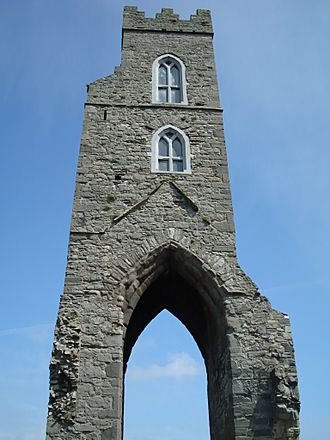Magdalene Tower, Drogheda facts for kids
Quick facts for kids Magdalene Tower |
|
|---|---|
|
Dominican Friary
|
|
 |
|
| General information | |
| Architectural style | Gothic |
| Address | Rope Walk, Magdalene Street. |
| Town or city | Drogheda |
| Country | Ireland |
| Coordinates | 53°43′05″N 6°21′03″W / 53.7181°N 6.3509°W |
| Construction started | 13th Century CE |
The Magdalene Tower is a famous landmark in Drogheda, County Louth, Ireland. It stands on the highest point in the northern part of the town. This tower is all that remains of a very important Dominican monastery.
The monastery was started around 1224 by Lucas de Netterville, who was a high-ranking church leader. The tower itself was built in the 14th century.
Contents
The Tower's Design
The tower has a beautiful Gothic arch at its base. Above this arch, there are two more levels. These levels are connected by a spiral staircase inside the tower.
A Place of History
The Dominican monastery was a very important place in Irish history. In the late 14th century, several powerful Irish leaders from Ulster met here. These leaders, including O'Donnell and O'Neill, formally accepted the rule of Richard II of England.
An English writer named William Makepeace Thackery visited the tower in 1842. He wrote about an old document that showed these Irish warriors. It described them riding to meet the King, who was dressed in fancy clothes. They would lay down their daggers and kneel before him. They were amazed by the King's rich tents and the clothes of his knights and ladies.
Peacemaking and Challenges
In 1412, the head of the monastery, Father Bennett, helped bring peace. He settled a conflict between people living on different sides of the River Boyne. This event helped unite the town of Drogheda.
Later, in 1467, a nobleman named Thomas FitzGerald, also known as "Thomas of Drogheda," faced a serious charge. He was executed near Drogheda. He had tried to set up a university in Drogheda, but the plan ended with his death.
Damage and Changes
The tower's top parts were badly damaged in 1649. This happened during a battle when Oliver Cromwell's army attacked Drogheda with cannons.
The tower was once located just inside the northern walls of the town. It was also close to a gate called St Sunday's Gate, which no longer exists.
Over time, religious life in Drogheda changed a lot. Many large monasteries and hospitals disappeared. Their lands were taken over by the Crown, which was the government at the time.
Images for kids
 | Precious Adams |
 | Lauren Anderson |
 | Janet Collins |


